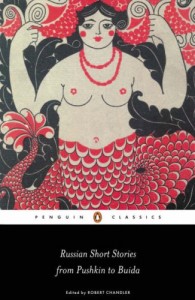The final part in my journey through Russian literature. For the original post in the series, please click here.
Varlam Shalamov
Here we move into the Stalinist era and writing about the Gulag. Through the Snow is a beautiful extended metaphor about writing as walking through virgin snow, with readers coming along behind on tractors and horses.
Berries is about prisoners being tempted by berries just on the other side of a line they are not allowed to cross. One of them crosses, and is shot dead. The guard comes up to the other one and says, ‘It was you I wanted. But you didn’t cross the line, you bastard.’ The details make it real – Shalamov did spend 15 years in Siberia for the crime of calling Ivan Bunin a “Russian classic”. So he knows how things work. After the prisoner is shot, the guard fires off a second shot. “There must always be two shots – the first is a warning.” The Snake Charmer deals with a writer’s predicament in jail: does he “pull novels” (i.e. re-tell famous stories to the prisoners) for extra soup, or is this the “ultimate humiliation”?
Duck is the best of the lot, sad and poetic, a story of doomed attempts at survival, not just from the starving duck with no strength to fly, but from the prisoner aiming to catch it and give it to the foreman so that he would be struck off the ominous “list” being drawn up, and also from the foreman himself who was hoping to give the duck to the superintendent, and also from the superintendent who was hoping to give the duck to the commandant. They all watch the starving man’s failed attempt to catch the starving duck, and they all realise it means their own death too, the extinguishing of their last chance to avoid the list.
What a Pity by Aleksandr Solzhenitsyn
A woman, Anna Modestovna, is passing a newspaper displayed on the street when she notices a mention of her father, who long ago fell foul of the regime and has been in prison camps for decades. The story highlights the instability of reputations in those times, and how quickly someone could be denounced. In this case the journalist seems unaware that her father is disapproved of, and praises some work he did decades ago. She sees a chance to take the newspaper, and perhaps even to show it as proof that he is now approved of by the authorities, enough to be praised in an official newspaper. But a policeman passes by, and stealing a piece of newspaper could put her in even more serious trouble. It’s quite a simple story, but touches on a lot of important issues and gives an insight into the times.
In the Autumn by Vasily Shukshin
This is a very affecting tale of lost love and the passing of time. Filipp is in love with Marya as a young man, but she wants a church wedding and he is politically active and against such things. So the part ways and each marry someone else, but for the rest of his life he keeps thinking about Marya. Now, as an old man operating a ferry across the river, he realises one day that the people he is transporting are a funeral party, and the dead woman must be Marya. He realises the terrible mistake he made all those years ago, losing the woman he loved for something that seems completely unimportant now. You really feel the anguish and the lost years, and making Filipp a ferry operator is a nice echo of Charon ferrying dead souls across the Styx.
Red Caviar Sandwiches by Asar Eppel
An odd love story, set in the midst of squalor. The Pushkin student dorm is a horrible place, crumbling, stinking, mean and dirty. Even as a young man and woman are trying to get some privacy to consummate their unlikely love affair, Eppel is describing the stalagmites of frozen shit in the outdoor latrine. The contrasts of romance and squalor, of Pushkin and frozen shit, of red caviar sandwiches and a dirty old barracks room, are brilliantly done. It seems impossible that anything good could happen in those surroundings, but something good does happen, as it does everywhere.
The Officer’s Belt by Sergei Dovlatov
Quite an entertaining story about drunken craziness in an army barracks. Dovlatov has a natural story-telling style that draws you into the story and makes you follow it to the end. This one left me a little disappointed, though, wondering what it was all about really. It’s apparently part of a larger work called “The Suitcase”, in which Dovlatov writes about the history of each of the objects in the suitcase he left the Soviet Union with, so I could see it working as part of that – the bizarre series of coincidences that lead to one object being in a particular place and time. On its own, though, I enjoyed it but didn’t love it.
Sindbad the Sailor by Yury Buida
A strange, short but quite memorable story about a dying old woman who asks for all her papers to be burnt. The people burning them see that the papers consist entirely of the same Pushkin love poem written out over and over again every day for fifty years. The sad details of the woman’s life are only briefly described, but hint at why she may have taken refuge in this poem and written it out on 18,250 separate sheets of paper. It really made me think about the things we do to keep going, and the pointlessness of so much of it in the end. It was a nice story to end up with, referring back to Pushkin who started it all off with the very first story.



